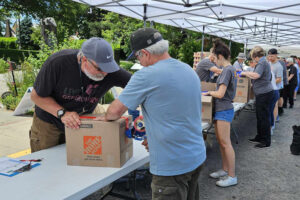The stay-home orders meant to slow the spread of COVID-19 have thrown a wrench into most people’s daily lives, but the shutdown poses an especially harsh problem for families experiencing homelessness.
“When you have families that are unhoused and you have a stay-at-home order, what do you do?” asked Linda Winnett, director of Family Promise of Clark County.
Family Promise, a nonprofit that helps homeless children and their families find permanent and stable housing using a community-based approach, normally operates a day center at the St. Thomas Aquinas Catholic Church in Camas and relies on a network of 13 Clark County host churches to help house and feed the Family Promise families overnight.
The coronavirus crisis, however, has completely upended the group’s normal routine.
“We basically had to move our families into motels. That was the biggest change we made,” Winnett said. “With the churches and the day center unable to do physical distancing, we chose to go with a motel. That’s what we do when we have any communicable thing — if a family member has the flu or if there’s a measles outbreak. It’s the best way we have to respond.”
But while periodic stays are a part of the Family Promise plan for communicable diseases, the cost of extended motel stays for up to 14 people during an unprecedented crisis like the COVID-19 pandemic are not built into the nonprofit’s budget.





